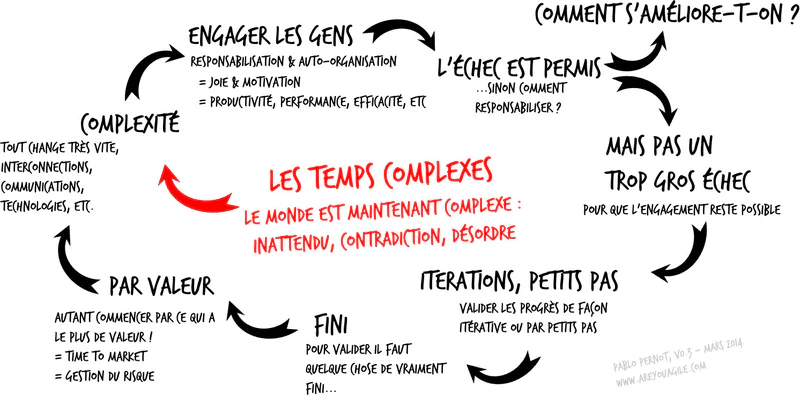I propose revisiting the notion of agile. The more months pass, the less I talk about the manifesto or the practices (elements that are nevertheless historically foundational), not that they lose much value, but rather that they remain quite difficult to grasp at first approach. And then – let’s also say it – my practice evolves, my thinking changes, toward an approach much more tied ultimately to management, to change management, to the organization of people.
So how to explain agile to people, here’s my way of doing it: I invoke complex times as the next stage of modern times, of Chaplin, Charlot, and his battle against Taylorism, or even more recently, those of Sartre and his post-war journal. We are beyond this modernity, and the word agile, is the rubber word, the word that slips everywhere, the easy word, to actually represent complexity (in this sense I completely agree with Dominique Dupagne’s analysis of the word “agile” in his Revanche du rameur).
Complex times

Dialogue
– We have entered complex times: everything goes very fast, too fast, everything is intertwined, everything changes, all the time, etc
– The only way to respond to this complexity is to empower, to engage people. Like a general who can no longer direct everything as he did 200 years ago, and who must rely on the self-organization of his troops, they remain faithful to his strategy, to his vision but implement their own tactics.
– But if you empower without leaving the right to make mistakes, you lie, you don’t really empower.
– Empowerment is also possible if it doesn’t put the organization in a state that’s too dangerous, otherwise who will dare do anything?
– So yes to empowerment but only if mistakes are possible, but they must not be “fatal”. To do this, we must move forward in small steps, in an iterative way. And judge step by step our progress. A small fever heals, a big one kills!
– But to really judge, we need finished things. It doesn’t matter how iterative if things aren’t finished (that’s then incremental…). Question yourself very hard about this notion of done (the best is to put it on the market! think about the minimum viable product).
– If you manage to deliver finished things, step by step, by expanding, then you might as well prioritize by value. Because a) we never have time to do everything, so we might as well do only things of value, b) this allows us to give ourselves the greatest guarantees and the greatest lessons, and finally c) to have a hell of a time to market (that is to say being able to put on the market very reactively).
– Time to Market very useful in these times of great complexity, because everything changes so quickly.
– Naturally this cycle is only learning (it’s necessary in this ambient complexity) if we constantly question ourselves about how to improve.
There you have it, meaning and coherence I hope. The next step is to make the general cited above multiple, to transform the vision from one into the vision of many, of a group, because collective intelligence is not just an easy phrase.